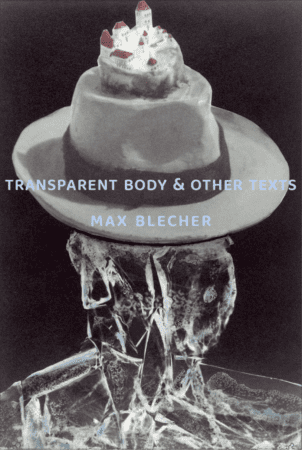Review: Transparent Body & Other Texts by Max Blecher

| Author | Max Blecher |
| Translated By | Gabi Reigh |
| Genre | Fiction, Poetry, Letters |
| Language(s) | Romanian |
| Format | 174 Pages |
| Publisher | Twisted Spoon Press |
| ISBN | 9788088628033 |
Reviewed by Amanda L. Andrei
The only thing more magical than receiving a letter from a friend is reading the letters of a writer you admire, and feeling as if they were sent to you. Translated from Romanian by Gabi Reigh, Transparent Body and & Other Texts collects poems, short prose, aphorisms, doodles, interviews—and best of all, letters—by the Romanian Jewish interwar writer Max Blecher. Reading Blecher’s work 80 years after his death feels as intimate and resonant as catching up with an old friend who has suffered and cared deeply.
Transparent Body was first published as a limited-edition release in 1934 when Blecher was 25 years old. By that time, he had been suffering from spinal tuberculosis for over 6 years, shuffling between various sanatoria before returning to his hometown in Botoșani, Romania. Despite his illness, he continued to write and publish texts that vibrate with urgency, intensity, and surrealism.
In the short triptych story “IX – MIX – FIX,” the narrator relates a bizarre scenario with emotional distance yet keen attention to the nightmarish physics that dissolves corporal and spiritual experiences into one. During one scene, he writes:
“I flew through chaotic chambers walled by bulbous, diseased clouds. I was hanging by the belly of a flying half-dog, my fingers digging into its flesh. But my legs were too long and, as they manically raced on the metal floor, metre-high sparks burst under my feet. Solitude chased me, flying towards me with a keener, sharper melancholy: I could no longer tell whether the rush of speed raced through my body or my soul.”
Blecher’s aphorisms also reflect cynical Romanian humor:
“Some people make others miserable by oppressing them, while others, conversely, by supporting them.”
Others, poetic despair:
“It is the magnetism of the abyss that looms over every conversation.”
Reading the list of aphorisms in one sitting feels a touch overwhelming: each maxim is a finely-cut gem of philosophy that deserves its own moment of contemplation.
The collection also has dozens of letters that reveal a different side of Blecher, more emotional and intimate, with humor that is less heavy and more sparkling.
In a letter dated May 16, 1930, to the French avant-garde poet Pierre Minet, he writes in response to a missed phone call from Minet about accidentally leaving a map in his carriage. The letter meanders to the 20-year-old Blecher describing his feelings of exasperated loneliness as he convalesces in the northern French commune of Bereck-sur-Mer. Some of his humor and frustration bursts out, provoking sympathy in the reader for this young artist who is deeply held back by his ill health and circumstances: “Of course, I am reliably informed that ordinary life is desperately idiotic, but I haven’t experienced it for myself!”
Other correspondence includes Blecher’s letters to other European literati such as Valerie Ionescu (editor of magazine Viața literatură), Alexandru Binder (editor of unu, which published works by other seminal Romanian modernist writers), and Geo Bogza (Romanian interwar avant-garde poet and early Surrealist). Blecher muses on his projects and artistic process, his family members and health, and his wishes and affection. Reigh’s translation beautifully portrays his vulnerability and shifting emotions, and an ample amount of footnotes in the correspondence provides more historical context for Blecher and his colleagues.
Although he passed away in 1938 at the age of 28, Blecher produced a stunning body of work in a short time. Transparent Body & Other Texts gives Anglophone literature an insight into a lesser-known avant-garde author—and not only through his surrealist fiction and prose, but to his struggles, doubts, and hopes.
Max Blecher’s novel Scarred Hearts was made into a film by one of the top Romanian filmmakers, Radu Jude.

Ioana Bîrjan (b.1997) is the author of Vârsta Iubirii which translates into English as The Age of Love (Heyday Books, 2023). The novel is inspired by the Lady of the Camellias and the opera La traviata. She earned a bachelor’s degree from the Faculty of Letters, Ovidius University of Constanța, where she is now a graduate student in the Romanian Studies program.
Read more of her work in magazines, in anthologies, and on her blog: https://scrierileioanei.wordpress.com/
SUPPORT SEEFEST
Not a member yet? Become an art patron with other SEEfest arthouse aficionados in support of great events and programs. Our mission is to keep you informed about initiatives from our wide network of fellow cultural organizations.
We Welcome YOU!

